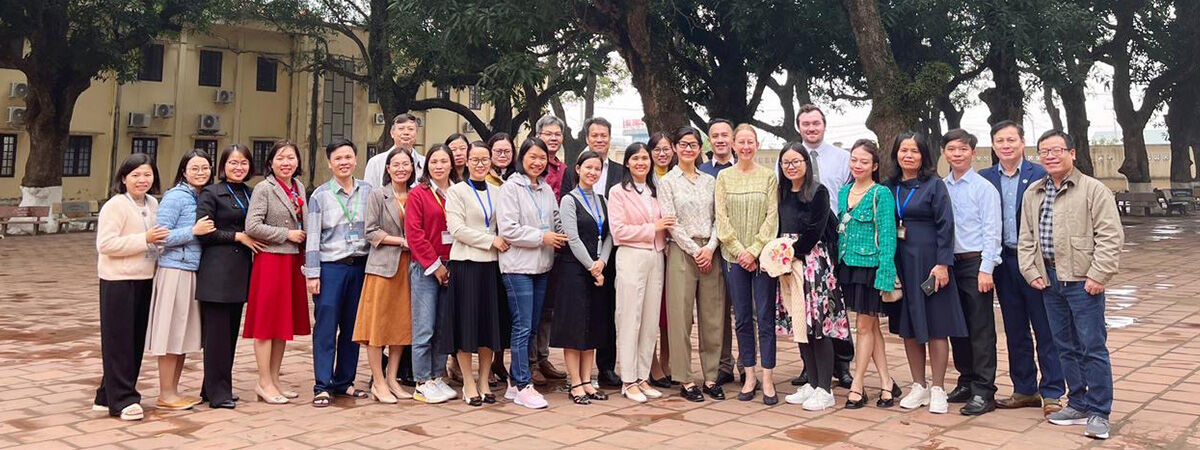This interdisciplinary project aims to address digital transformation across Vietnam, focusing on developing practices with educators from diverse geographic areas and different gender groups across Vietnam on the use of Artificial Intelligence (AI) tools for teaching and learning.

Project Aims
The recent proliferation of AI in education has coincided with the Vietnam Government's decision on "a national digital transformation programme until 2025 orientation to 2030" (Decision749/QD-TTg 2020).
Inclusivity is identified as a key area of digital transformation for education prioritising providing schools and pupils in rural areas with access to the latest digital technologies and developing digital literacy and competencies for teachers and pupils from different gender groups (Anh Vinh 2023; Dang Dao 2022).
This project involves education and computer science researchers from the UK, including Birmingham City University and Nottingham Trent, and Vietnam (HCMUE, HUE, VNU, VU) working with schools and educators in Vietnam to co-develop pedagogical practices and resources to trial the latest AIEd technologies.
Bespoke tools will be piloted with educators from six schools. The project focuses on the pedagogical experiences, considerations and needs from rural and urban areas in Vietnam to learn about the perspectives of educators from different gender groups from these areas on using AI in education.
This is underpinned by UNESCO's recommendation (2019) that 'as AI is emerging, there is an opportunity to involve education stakeholders at an early stage to shape them based on educators', learners' and education leaders' perspectives for sustainable development and implementation of AI'. Project findings will be developed into resources for educators and researchers; and inform a roadmap and recommendations for a sustainable development of emerging tech for education.
Project Team
Project leads: Dr Vanessa Cui, Dr Louise Wheatcroft and Thi Tuyet Luong Tran (Birmingham City University, UK) and Dr Trang Thi Thu Nguyen (Ho Chi Minh City University of Education, Viet Nam)
Impacting Society
A priority of Vietnam's digital transformation is to provide schools and pupils in rural areas with access to the latest digital technologies and to develop teachers' and pupils' digital literacy (recommended by UNESCO, OECD, and MOET, Anh Vinh 2023; Dang Dao 2022). This project will directly address this challenge by working with schools and teachers from urban and rural schools across 3 regions on an AI education teacher development programme, piloting the latest AIEd tools for personalising learning and feedback and enhancing learning engagement as well as developing pedagogical practices and principles on the use of generative AI in schools. This project aims to produce teacher training resources, research findings and recommendations on effective use of AI in education in urban and rural schools across Vietnam.
As a developing country, Vietnam needs high quality workforce with digital literacy and skills and this is the key aim of Vietnam's ongoing digital transformation national policy (Decision749/QD-TTg, 2020). This project will enable tangible digital literacy and skills development of high school teachers, university students, teachers and teacher educators. To keep pace with the rapid digital development impacting all areas of society, educators and students require AI literacy and competencies to navigate through a digital technology-powered society. This project empowers them to navigate the evolving landscape and address education challenges effectively.
The project will address differences between gender groups in digital technology use and digital literacy development. Research has highlighted differences in engagement and preferences by teachers and learners from different gender groups in Vietnam and recommended a more inclusive approach to understanding and addressing such differences (Gottschalk & Weise 2023).
Engaging with educators and learners from different gender groups will create opportunities to address the underrepresentation of a particular group in using AI in education.
Other aspects of this project that will positively impact underrepresented groups include: 1) strengthening women's capacities in AI in education; 2) boosting participants' confidence in navigating the challenges of the digital world; 4) for rural areas: raising awareness and growing capacity in using AI.
Capacity development and sustainable research
We will create a long-lasting network with these partners which will act as the foundation for inclusive development and implementation of AI in education. The research and project work is designed to facilitate the development of larger projects to follow the recommendations based on the findings from pilot projects at partner schools. Through our project work, we will support the scholarship development of participating schools and teachers, to enable their capacity building to become research-active teachers who can carry on using research to inform their practice beyond the lifetime of our project.